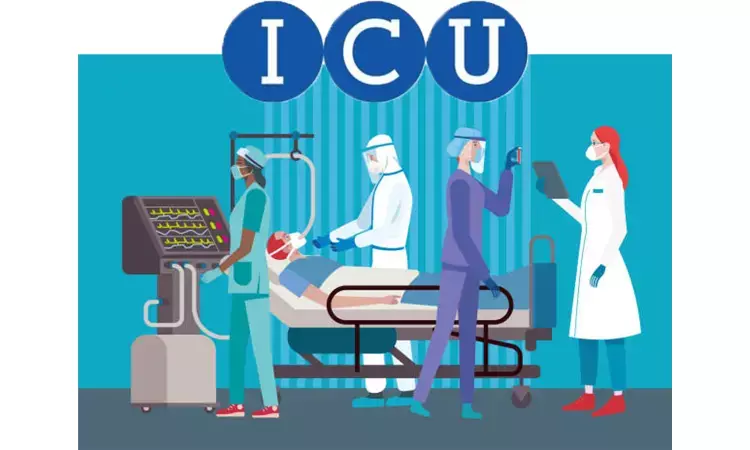- Home
- Medical news & Guidelines
- Anesthesiology
- Cardiology and CTVS
- Critical Care
- Dentistry
- Dermatology
- Diabetes and Endocrinology
- ENT
- Gastroenterology
- Medicine
- Nephrology
- Neurology
- Obstretics-Gynaecology
- Oncology
- Ophthalmology
- Orthopaedics
- Pediatrics-Neonatology
- Psychiatry
- Pulmonology
- Radiology
- Surgery
- Urology
- Laboratory Medicine
- Diet
- Nursing
- Paramedical
- Physiotherapy
- Health news
- Fact Check
- Bone Health Fact Check
- Brain Health Fact Check
- Cancer Related Fact Check
- Child Care Fact Check
- Dental and oral health fact check
- Diabetes and metabolic health fact check
- Diet and Nutrition Fact Check
- Eye and ENT Care Fact Check
- Fitness fact check
- Gut health fact check
- Heart health fact check
- Kidney health fact check
- Medical education fact check
- Men's health fact check
- Respiratory fact check
- Skin and hair care fact check
- Vaccine and Immunization fact check
- Women's health fact check
- AYUSH
- State News
- Andaman and Nicobar Islands
- Andhra Pradesh
- Arunachal Pradesh
- Assam
- Bihar
- Chandigarh
- Chattisgarh
- Dadra and Nagar Haveli
- Daman and Diu
- Delhi
- Goa
- Gujarat
- Haryana
- Himachal Pradesh
- Jammu & Kashmir
- Jharkhand
- Karnataka
- Kerala
- Ladakh
- Lakshadweep
- Madhya Pradesh
- Maharashtra
- Manipur
- Meghalaya
- Mizoram
- Nagaland
- Odisha
- Puducherry
- Punjab
- Rajasthan
- Sikkim
- Tamil Nadu
- Telangana
- Tripura
- Uttar Pradesh
- Uttrakhand
- West Bengal
- Medical Education
- Industry
Early steroid administration improves outcomes in septic shock patients

Clinical studies evaluating the use of hydrocortisone in patients with septic shock are heterogeneous in design with conflicting results. The appropriate time in which to initiate hydrocortisone after shock onset is unknown.
Researchers have found in a new study that earlier treatment with hydrocortisone reduces the risk of death and other adverse outcomes.The study has been published in the Official Journal of the Shock Society SHOCK: Injury, Inflammation, and Sepsis: Laboratory and Clinical Approaches.
For critical care specialists, the study provides new evidence on the optimal timing of steroid treatment for patients with vasopressor-dependent septic shock. "If hydrocortisone is to be initiated in patients with septic shock, it should be initiated within at least the first 24 hour after shock onset, and ideally within the first 12 hours," according to the new research by Gretchen L. Sacha, PharmD, and colleagues of the Cleveland Clinic.
New Evidence on Timing of Hydrocortisone for Septic Shock The study included 1,470 patients with septic shock treated with hydrocortisone at Cleveland Clinic ICUs between 2011 and 2017. All patients required vasopressors to maintain near-normal blood pressure after fluid resuscitation.
Based on the timing of hydrocortisone therapy, patients were divided into five groups. About 39 percent started hydrocortisone within 0 to 6 hours after shock onset. Other groups started hydrocortisone at 6 to 12 hours (about 16 percent of patients), 12 to 24 hours (18 percent), 24 to 48 hours (13 percent), or after 48 hours (15 percent).
Toward determining the optimal timing of hydrocortisone initiation, time alive and off vasopressors - that is, with blood pressure within the target range - was compared among groups, along with other key outcomes. Patient characteristics varied between groups, including higher sepsis severity scores in patients who started hydrocortisone earlier.
"Despite being more critically ill at baseline, patients who received hydrocortisone earlier had better clinical outcomes when compared to patients who received hydrocortisone later after shock onset," Dr. Sacha and coauthors write. Patients starting steroids earlier not only had more days alive and off vasopressors but also had lower mortality rates. For example, risk of in-hospital death was 48.5 percent for patients initiating hydrocortisone at 0 to 6 hours versus 59.0 percent for those who started treatment after 48 hours.
After adjustment for severity of illness and other factors, earlier hydrocortisone therapy was still associated with increased vasopressor-free days. In this analysis, the odds of death in the ICU were 40 percent lower in patients receiving hydrocortisone within 0 to 6 hours, compared to those who started treatment beyond 48 hours.
Sepsis occurs when the immune system mounts an overwhelming inflammatory response to infection in the blood or elsewhere in the body. Septic shock is present in patients who develop a sharp drop in blood pressure and other metabolic abnormalities, with a risk of progression to organ failure.
Hydrocortisone is recommended for some patients with vasopressor-dependent septic shock, but there is ongoing debate over how and when it should be used. Some smaller studies have suggested hydrocortisone is more likely to be beneficial when started earlier after shock onset.
The new study, in a relatively large sample of patients, highlights the importance of early hydrocortisone therapy. "Timing of hydrocortisone initiation in patients with septic shock appears to be crucial and hydrocortisone should be started within the first 12 h after shock onset," Dr. Sacha and coauthors write.
In contrast, starting hydrocortisone after 24 hours does not appear to have any benefit. The researchers conclude, "Future randomized studies should focus on the timing of hydrocortisone initiation, ensuring initiation within the first 12 hours from shock onset."
Hina Zahid Joined Medical Dialogue in 2017 with a passion to work as a Reporter. She coordinates with various national and international journals and association and covers all the stories related to Medical guidelines, Medical Journals, rare medical surgeries as well as all the updates in the medical field. Email: editorial@medicaldialogues.in. Contact no. 011-43720751
Dr Kamal Kant Kohli-MBBS, DTCD- a chest specialist with more than 30 years of practice and a flair for writing clinical articles, Dr Kamal Kant Kohli joined Medical Dialogues as a Chief Editor of Medical News. Besides writing articles, as an editor, he proofreads and verifies all the medical content published on Medical Dialogues including those coming from journals, studies,medical conferences,guidelines etc. Email: drkohli@medicaldialogues.in. Contact no. 011-43720751


